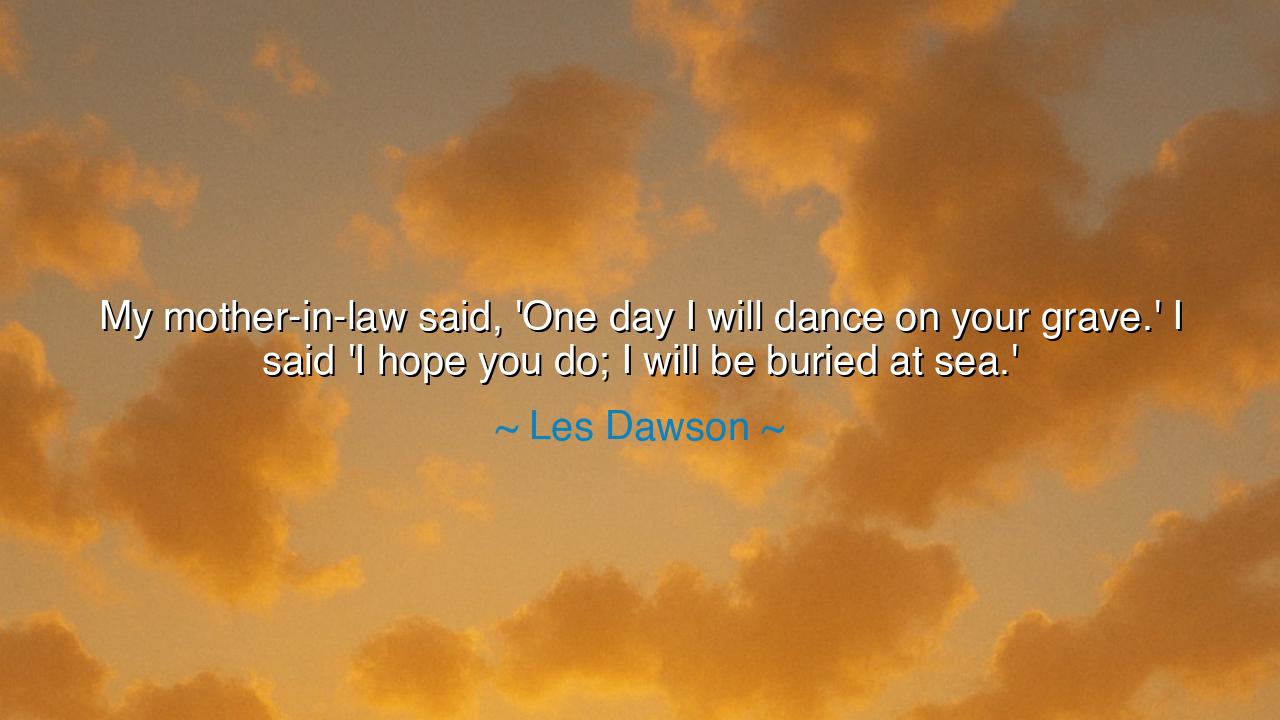
My mother-in-law said, 'One day I will dance on your grave.' I
My mother-in-law said, 'One day I will dance on your grave.' I said 'I hope you do; I will be buried at sea.'






In the sharp yet humorous words of Les Dawson, the English comedian whose wit concealed a philosopher’s soul, we find this piercing jest: “My mother-in-law said, ‘One day I will dance on your grave.’ I said, ‘I hope you do; I will be buried at sea.’” Though born of laughter, this line holds a wisdom as deep as the ocean itself. For behind its playful venom lies a truth about the human spirit, about conflict and grace, and about the timeless art of turning bitterness into humor. Dawson’s words are not merely a joke about family discord — they are a master’s lesson in how to meet life’s hostility with wit rather than wrath, and how to reclaim power not by aggression, but by laughter.
In the days of the ancients, the wise knew that the tongue was a weapon mightier than the sword. A warrior may conquer the flesh, but a humorist conquers the heart — even the hostile one. Dawson’s quip stands in the long tradition of those who faced insult with elegance, transforming anger into amusement. In his retort, we see not a man wounded, but one who dances above the venom of words. To say “I will be buried at sea” is to rise beyond the threat of the grave; it is to render the aggressor’s malice powerless. Thus, the humor becomes a shield, forged from irony and grace, deflecting the arrow of bitterness while leaving the spirit untouched.
The mother-in-law, as figure and symbol, has long stood in the lore of human jest as a representation of familial tension — the inevitable clash between worlds, generations, and temperaments. But Dawson’s response transforms this familiar battlefield into a moment of art. He refuses to fight upon the same ground of anger; instead, he ascends into humor, turning conflict into comedy. Like the ancient jesters who could speak truth to kings under the veil of laughter, he teaches us that wit can be both a weapon and a wisdom — a means not of destroying the enemy, but of transcending the fight altogether.
Let us remember the story of Diogenes, the Cynic philosopher of Greece, who was once mocked by a nobleman for living in a barrel. When the nobleman said, “I am not as much a beast as you,” Diogenes replied, “Then you are half one.” In that single moment, he overturned scorn with insight. Like Dawson, Diogenes showed that the wise man never stoops to quarrel — he transforms it into teaching, into art, into laughter. The same spirit breathes through Dawson’s jest: humor as defiance, humor as liberation, humor as the refusal to let life’s pettiness take root in the soul.
Yet beneath the laughter, Dawson’s words also reveal something tender — the human need to disarm cruelty without hatred. In saying he will be “buried at sea,” he turns confrontation into absurdity, leaving no space for anger to flourish. The image of the ocean burial becomes a metaphor for forgiveness: a vast, cleansing expanse where resentment is dissolved, where no one can dance upon your grave because you have given your spirit to the waves. Here lies the secret of Dawson’s genius — he shows that humor, when wielded with grace, becomes not just mockery, but freedom.
The meaning, then, is double-edged. On one side, it reminds us that life will always bring friction — between generations, between personalities, between the proud and the humble. On the other side, it teaches that the true measure of character is how one responds. The fool answers insult with insult; the wise answers it with lightness. By laughing instead of striking, by imagining the sea instead of the grave, Dawson teaches the art of emotional alchemy: transforming pain into play, venom into vision.
Let this be the lesson to those who walk the path of wisdom: when faced with malice, do not let it poison your heart. Instead, wield humor as your lantern, for laughter dispels the shadows where bitterness hides. Speak not from pride, but from calm. When others hurl their words like stones, turn them into stepping stones beneath your feet. Learn from Dawson — and from all who have met mockery with mirth — that joy is the truest form of strength.
And so, my children, when you hear the world’s harsh voices, remember the spirit of the sea. Let your soul be vast, ungraspable, and ever free. If someone threatens to dance upon your grave, smile — and tell them you will be buried at sea. For laughter, when born from wisdom, is not escape; it is triumph — the final, immortal dance of the spirit that no grave, no bitterness, and no sorrow can contain.






AAdministratorAdministrator
Welcome, honored guests. Please leave a comment, we will respond soon